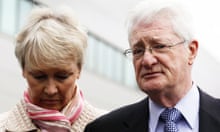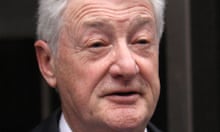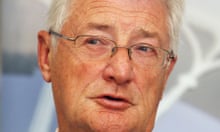A retired businessman who has fought a two-year battle against extradition to the US has been flown to America after exhausting all his legal options.
Christopher Tappin, 65, who faces arms-dealing charges, handed himself into British police at Heathrow airport on Friday. He was passed into the custody of US marshals for the transatlantic flight. Reports said he landed in Houston on Friday evening and will make his first court appearance in El Paso on Monday. He could face up to 35 years in prison if convicted of conspiring to sell components for Iranian missiles.
Tappin's US lawyer Dan Cogdell said he would "vigorously argue" for his client to be released on bail.
He told the BBC: "There is no reasonable basis to believe that he is a flight risk or a danger. He is a respected businessman with no criminal record whatsoever."
The high-profile case has fuelled criticism of the UK's extradition arrangements with both the US and Europe. As he arrived at the Heathrow, Tappin said: "I look to [David] Cameron to look after my rights, and he has failed to do so.
"I have no rights. Abu Qatada [whom the government wants to deport to Jordan] is walking the streets of London today and we cannot extradite him. He has more rights than I have.
"If I was a terrorist, I would not be going to America. I think it's a shame, a disgrace. The government, while in opposition, promised to reform the law … they failed to do so and they've let me down, they've let you down, they've let the whole country down."
Accompanied by his wife, Elaine, who was in tears, heTappin, a former president of the Kent Golf Union, said he was "philosophical" about his chances of ever returning to Britain. "I am 65 years old now," he told the BBC. "If I was to serve 35 years, then I would be 100 by the time I came back.
"There aren't many people who reach 100, so I have to be philosophica – I may never come home to my own country again."
Tappin, from Orpington, Kent, denies attempting to sell batteries for surface-to-air missiles that were to be shipped from the US to Tehran via the Netherlands.
He claims he was the victim of entrapment in a "sting" organised by US government agents. He has said that, for justice to be done, he should be tried by a jury of his peers in the UK, not jurors 3,000 miles away.
He added: "I won't be given leave to get any of my witnesses who are based in the UK because they are not allowed to testify in America by virtue of the fact they do not allow video interrogation. They have to appear personally.
"If I wanted anything, it was to be tried in the UK, not in America, because the Americans have never had to produce one piece of evidence.
"All the evidence shown to the court so far has come from our side. They have not had to produce any evidence whatsoever. We believe there is no evidence … it's just an accusation" . He has been caring for his wife, who is ill.
Magistrates and the high court backed his extradition this month and a last-ditch plea to the European court of human rights was rejected.
An independent review of the UK's extradition arrangements by the retired court of appeal judge Sir Scott Baker last year found that the treaty between the US and the UK was both balanced and fair. Neither the treaty nor the European Arrest Warrant require the court be presented with prima facie evidence of a crime.
On Wednesday, Cameron confirmed the government would be responding to the judicial review in a "proper, sober and thoughtful" wayto the judicial review.
Such treaties, he warned, "show respect to [other countries'] judicial processes and make sure that people who are accused of crimes are tried for those crimes. Britain can benefit from that as well."
Critics maintain the treaty is one-sided. Jago Russell, the chief executive of Fair Trials International, said: "After years of talk about extradition reform and countless cases of injustice, still nothing has been done.
"It is high time the government brings forward concrete proposals to build much-needed safeguards into our laws."
Isabella Sankey, the director of policy for the civil rights group Liberty, said: "No British court has ever been allowed to examine any evidence against Christopher Tappin or consider whether he should be tried here.
"Even if a US jury eventually finds him not guilty, he'll still spend years in a Texan jail awaiting trial, thousands of miles from his home and sick wife."
Asked about Tappin's comparison of his case with that of Abu Qatada, a Downing Street spokesman said: "They are completely different cases."
But Lord Carlile of Berriew, the Liberal Democrat peer who was the government's former independent reviewer of anti-terrorism legislation,said the US system created an "unlevel playing field".
Carlile told the Boulton programme on Sky News: "I think that the American plea bargaining system is something we would not tolerate in this country. It creates a very unlevel playing field.
"My wish is that a parliamentary select committee, perhaps the home affairs select committee, should carry out a very early enquiry into his case and whether it is acceptable for people to be sent back to the US to face their intimidating plea bargaining system which effectively forces people to choose between, say, 35 years imprisonment and a short sentence which is not a fair choice."
Carlile said he had examined one case where a defendant in the US was offered a choice between a "ludicrous" 720 years in prison, if convicted, or of travelling to the UK to give evidence against his brother and serving three to four years.
"Who can resist that sort of pressure? It is irrelevant whether the evidence he gives here is true or false, whether the plea he gives is true or false. It is the process. If you examine English law, particularly the Police and Criminal Evidence Act, then most American plea bargains would not be admitted as part of the English evidential system.
"I am absolutely appalled by it. We do plea bargains in this country, and I am in favour of appropriate plea bargains, but we have a proper paper trail. They don't in America. Each meeting is recorded. They don't in America.
Carlile added: "Mr Tappin made a good point comparing himself with Abu Qatada That was probably the best point he has made throughout this whole saga...The American system will be watched very closely by commentators in this country. I am sure that President Obama, who is a very distinguished lawyer, does not wish to see the American system held up to ridicule in the UK."


